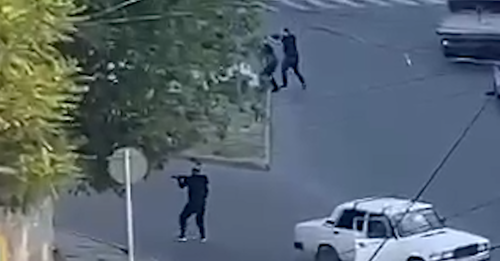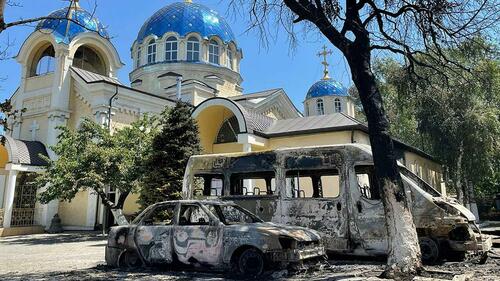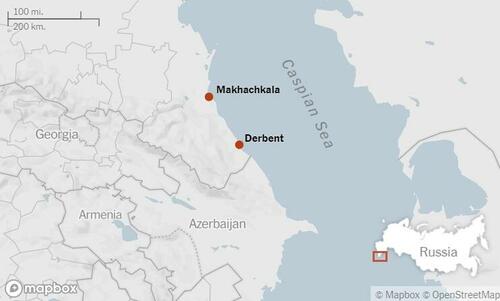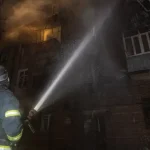
The death toll from the Sunday terror attack on the Dagestan cities of Derbent and Makhachkala in southern Russia has risen significantly, now that further details have emerged of the religiously-inspired attack which targeted Orthodox churches and a synagogue, apparently by black-clad jihadists.
Russia’s Investigative Committee and state media announced Monday that 20 people died, including at least 15 police officers and an Orthodox priest, making it one of the biggest terror attacks in this region of the north Caucuses in decades. An additional 46 were injured.
Initial reports as news of the incident was still emerging indicated at least nine had died, mostly police officers, and that two dozen were injured.
"This evening in the cities of Derbent and Makhachkala armed attacks were carried out on two Orthodox churches, a synagogue and a police checkpoint,” the statement said according to state-run RIA Novosti news agency.
Additionally six of the attackers were "liquidated" following large-scale shootouts in the streets, which also involved the assailants hurling Molotov cocktails to set fires. The attacks were highly coordinated given that the two cities where they unfolded simultaneously are 78 miles apart.
The Russian Orthodox Church later confirmed that its archpriest Nikolai Kotelnikov had been “brutally killed” in Derbent, at a moment celebrations for the feast of Pentecost were underway. It's been widely reported that the terrorists broke into the church and cut the priest's throat.

The head of the Russian Orthodox Church was cited in the NY Times as follows:
The mayhem highlighted the long-running ethnic and religious tensions in Russia, particularly in the country’s southern Caucasus region, which includes Dagestan. Patriarch Kirill I, the head of the Russian Orthodox Church, said it was “no coincidence” that the attack took place on the day Orthodox Christians observe Pentecost.
“We see that the enemy is not giving up on attempts to destroy interreligious peace and harmony within our society,” Kirill said in a statement.
This is what the #Synagogue in #Derbent looks like after the vile terrorist attack committed by the local jihadists in #Russia. pic.twitter.com/xsUSQZwDzO
— Faraz Pervaiz (@FarazPervaiz3) June 24, 2024
The same report also notes that it was been "Left unsaid was who, exactly, the enemy was. There was no comment from the Kremlin and the authorities said little about the identities of the attackers, though some state media reports said some of the gunmen may have been sons of a local official."
Given the country is still reeling from the even bigger March 22 Crocus City Hall attack in Moscow, which killed at least 145 and wounded hundreds more, naturally suspicion has fall on ISIS-K or another radical Islamist terror group.

There are reportedly fears among the broader population that there could be more violence and terror to come, given 20 years ago this region which borders Chechnya was plagued by weekly and daily violence.
"Now there is a different Russia," Kremlin spokesman Dmitry Peskov said Monday. "Society is consolidated and such terrorist manifestations are not supported by society in Russia or in Dagestan."
The death toll from the Sunday terror attack on the Dagestan cities of Derbent and Makhachkala in southern Russia has risen significantly, now that further details have emerged of the religiously-inspired attack which targeted Orthodox churches and a synagogue, apparently by black-clad jihadists.
Russia’s Investigative Committee and state media announced Monday that 20 people died, including at least 15 police officers and an Orthodox priest, making it one of the biggest terror attacks in this region of the north Caucuses in decades. An additional 46 were injured.
Initial reports as news of the incident was still emerging indicated at least nine had died, mostly police officers, and that two dozen were injured.
“This evening in the cities of Derbent and Makhachkala armed attacks were carried out on two Orthodox churches, a synagogue and a police checkpoint,” the statement said according to state-run RIA Novosti news agency.
Additionally six of the attackers were “liquidated” following large-scale shootouts in the streets, which also involved the assailants hurling Molotov cocktails to set fires. The attacks were highly coordinated given that the two cities where they unfolded simultaneously are 78 miles apart.
The Russian Orthodox Church later confirmed that its archpriest Nikolai Kotelnikov had been “brutally killed” in Derbent, at a moment celebrations for the feast of Pentecost were underway. It’s been widely reported that the terrorists broke into the church and cut the priest’s throat.

The head of the Russian Orthodox Church was cited in the NY Times as follows:
The mayhem highlighted the long-running ethnic and religious tensions in Russia, particularly in the country’s southern Caucasus region, which includes Dagestan. Patriarch Kirill I, the head of the Russian Orthodox Church, said it was “no coincidence” that the attack took place on the day Orthodox Christians observe Pentecost.
“We see that the enemy is not giving up on attempts to destroy interreligious peace and harmony within our society,” Kirill said in a statement.
This is what the #Synagogue in #Derbent looks like after the vile terrorist attack committed by the local jihadists in #Russia. pic.twitter.com/xsUSQZwDzO
— Faraz Pervaiz (@FarazPervaiz3) June 24, 2024
The same report also notes that it was been “Left unsaid was who, exactly, the enemy was. There was no comment from the Kremlin and the authorities said little about the identities of the attackers, though some state media reports said some of the gunmen may have been sons of a local official.”
Given the country is still reeling from the even bigger March 22 Crocus City Hall attack in Moscow, which killed at least 145 and wounded hundreds more, naturally suspicion has fall on ISIS-K or another radical Islamist terror group.

There are reportedly fears among the broader population that there could be more violence and terror to come, given 20 years ago this region which borders Chechnya was plagued by weekly and daily violence.
“Now there is a different Russia,” Kremlin spokesman Dmitry Peskov said Monday. “Society is consolidated and such terrorist manifestations are not supported by society in Russia or in Dagestan.”
Loading…





